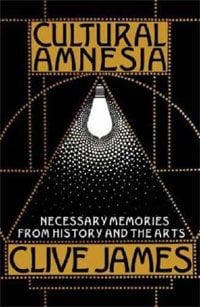
In his “overture” to Cultural Amnesia, titled “Vienna”, Clive James pays tribute to that city’s café culture around the turn into the 20th century: “the best evidence that the most accommodating and fruitful ground for the life of the mind can be something more broad than a university campus.” Throughout his career as a writer and critic James has seemingly aspired to recreate this milieu, mainly its breadth of knowledge, wit, and intellectuality grounded in the rigors of journalism. Late in his career he has made an intentional and monumental stab at doing so with a collection of essays that is by turns heady and exact, obscure and inviting, authoritative and down-to-earth. One of its goals is to capture the “convulsive mental life of the 20th century,” but the multitudes within say as much about the author’s as man’s store of knowledge and experience.
Though the book is made up of alphabetically arranged essays on 106 persons — including historians, politicians, philosophers, actors, and writers — any order is let to fall where may. “If I have done my job properly, themes will emerge from the apparent randomness and make this work intelligible.”
The selections are idiosyncratic. Of the lack of women discussed he says, “Female readers might find themselves grateful for that. This is a book about a world men made, and it taught plenty of us to wish that women had made it instead.” I’m not sure if that cuts it as an excuse. Same with his heavy concentration on Western figures, which deserves to be pointed out since he chides other critics for the same fault elsewhere.
But this large conceptual fault is veiled by the strength of the writing on which it is focused. If the chosen topics reflect quirks in James’s personality, the structure of each essay reveals even more about the encyclopedic cross-referencing of the author’s mind. Typically he starts on the subject and proceeds wildly into unforeseen territory. An essay on the director Michael Mann spins a quote from Heat — “Let’s violate his ass” — out into a dissertation on the authorial authority in scripts and the way words are trumped by a film’s visuals. On Ernesto Sabato he considers the tango. The section on Sir Thomas Browne is concerned with the art of brevity and good book titles.
James tosses off references and cites books read in different languages with a casual confidence tempered by winning modesty. “Cultural amnesia” could easily imply snobbishness about the decline of learning and “what needs to be known,” but the tone is consistently encouraging of the reader without admonishment or hectoring.
At times his assumption of equal intelligence with the reader is flattering and laughable. Over and over he encourages tackling obscure and lengthy works in their native language: “His [Charles de Gaulle’s] four volumes of autobiography are all available in English. A beginner with French, however, could do worse than become acquainted with them …” I appreciate the sentiment, but by my isolationist American point of view, saying “hello”, “goodbye”, and “thank you” is thought to demonstrate a good beginner’s grasp of a language, not the ability to tackle multivolume works of history. However the snatches of writings he provides from his favorite untranslated works from the Viennese cafés, notably those of Alfred Polgar and Egon Friedell, almost made me want to study German.
This infectious intellectualism is meant to prod younger readers to use the book as a preventative measure against cultural amnesia, to be something of torch of knowledge to be carried forward by preceding generations. In this James’s humanist intentions burn most strongly. In the introduction he states, “If the humanism that makes civilization civilized is to be preserved into this new century, it will need advocates. Those advocates will need a memory, and part of that memory will need to be of an age in which they were not yet alive.”
The period meant to be most preserved here is that of the author’s and his immediate predecessors in the 20th century. The majority of the subjects are from this period. And most of the essays are a reckoning of intellectuals’ actions over that century’s when-push-comes-to-shove moral crises: Nazi Germany, Fascist Italy, occupied France, Stalinist and Chinese Communism, the Argentine military dictatorships, and terrorism as a military tactic.
Jean-Paul Sartre and Simone de Beauvoir are attacked for their blind-eye devotion to Communism and their disingenuous claims to French Resistance heroism. Albert Camus is in turn praised for questioning “whether the horrors of Nazism in any way legitimized the horrors of communism.” On Jorge Luis Borges he is more conflicted, flummoxed by his silence regarding “the junta’s war against the innocent,” but admitting that, “it would be foolish for an outsider to quarrel with his enormous creative achievement”.
But broad lines between the virtuous and the traitor, the good writer and the bad writer, are never drawn. James recognizes the stickiness of wading through one’s present day, particularly on the global stage of most of the persons discussed. Yet he is also determined to draw meaning for the betterment of civilization. “It was the human mind that got us this far, by considering what had happened in history; by considering the good that had been done, and resolving to do likewise; and by considering the evil, and resolving to avoid its repetition.”
Such admirable, if familiar, statements are made refreshing and inspiring through James’ prose. Cultural Amnesia is a potent collection of his learned illuminations.

![Call for Papers: All Things Reconsidered [MUSIC] May-August 2024](https://www.popmatters.com/wp-content/uploads/2024/04/all-things-reconsidered-call-music-may-2024-720x380.jpg)



